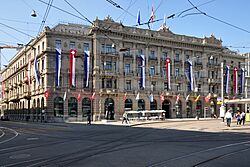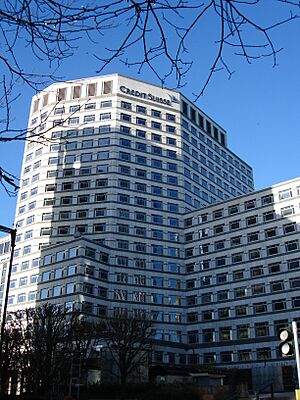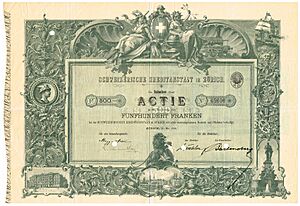Credit Suisse facts for kids

Headquarters on Paradeplatz in Zürich, designed by architect Jakob Friedrich Wanner and inaugurated in 1876
|
|
|
Formerly
|
Schweizerische Kreditanstalt |
|---|---|
| Subsidiary | |
| ISIN | [https://isin.toolforge.org/?language=en&isin=CH0012138530 CH0012138530] |
| Industry | Financial services |
| Fate | Acquired by UBS to avoid bankruptcy in June 2023 |
| Founded | 5 July 1856 |
| Founders |
|
| Defunct | 31 May 2024 |
| Headquarters |
,
Switzerland
|
|
Area served
|
Worldwide |
|
Key people
|
|
| Products | Investment and private banking, asset management |
| Revenue | |
|
Operating income
|
|
| AUM | |
| Total assets | |
| Total equity | |
|
Number of employees
|
|
| Parent | UBS Group AG |
| Capital ratio | |
| Rating | S&P: BBB− Fitch: BBB Moody's: Baa2 |
Credit Suisse Group AG was a large bank and financial services company from Switzerland. It was known for helping people and businesses manage their money. On May 31, 2024, Credit Suisse officially stopped operating as a separate company. Its main office was in Zürich, Switzerland.
Credit Suisse had offices all over the world. It offered services like helping companies with big projects, managing money for wealthy individuals, and handling investments. The bank was also known for keeping client information very private.
The company started in 1856. Its first goal was to help build Switzerland's railway system. It also provided loans that helped create Switzerland's electrical grid and the wider European rail system. In the 1900s, Credit Suisse began offering services to everyday people, like savings accounts. This was because more people in the middle class needed banking services.
Credit Suisse worked with another bank called First Boston starting in 1978. Later, it bought a large part of First Boston in 1988. Between 1990 and 2000, Credit Suisse bought other companies like Winterthur Group and Swiss Volksbank.
The bank was not as badly affected as some others during the 2008 financial crisis. After the crisis, it started to make its investment business smaller. It also reduced costs and let some employees go. In March 2023, another Swiss bank, UBS, announced it would buy Credit Suisse. This was done to help Credit Suisse avoid major financial problems. UBS completed the purchase in June 2023.
Contents
History of Credit Suisse
Starting the Bank
Alfred Escher helped start Credit Suisse. He was important in making sure Switzerland's railways were built by private companies, not the government. Escher founded Credit Suisse, originally called the Swiss Credit Institution (Schweizerische Kreditanstalt), on July 5, 1856. Its main purpose was to provide money for railway projects in Switzerland. This helped avoid relying on French banks.
Escher wanted to start the company with three million shares. Instead, he sold 218 million shares in just three days! The bank opened on July 16, 1856. It was similar to a French bank called Crédit Mobilier, which also funded railways. However, Credit Suisse was more careful with its loans, focusing on shorter-term projects. In its first year, a quarter of the bank's earnings came from the Swiss Northeastern Railway.
Credit Suisse played a big part in Switzerland's economic growth. It helped develop the country's money system. It also funded new businesses and invested in the Gotthard railway. This railway connected Switzerland to the European rail system in 1882. Credit Suisse also helped create Switzerland's electrical grid. By the end of the 1870 Franco-Prussian War, Credit Suisse had become the largest bank in Switzerland.
In the late 1800s, Credit Suisse started banking and insurance companies in other places like Germany and Geneva. It also created insurance companies such as Swiss RE and Swiss Life. In 1886, the bank had its first year without making a profit. This was due to losses in farming, new investments, and international trade.
In the early 1900s, Credit Suisse began serving regular customers. It offered deposit counters, currency exchange, and savings accounts. The first branch outside of Zürich opened in 1905 in Basel. The bank helped companies recover after World War I by giving loans for rebuilding. During the economic downturn of the 1920s, the bank's profits and employee salaries were cut. After World War II, Credit Suisse helped with rebuilding efforts in other countries.
Growing and Partnering


In 1978, Credit Suisse partnered with First Boston to create Credit Suisse First Boston in Europe. It also bought a large share of First Boston's operations in the United States. This partnership helped First Boston become very successful in Europe.
In 1987, Credit Suisse bought a London stockbroker firm called Buckmaster & Moore. This firm had many wealthy private clients.
Later, other Credit Suisse First Boston companies were started in Switzerland, Asia, London, New York, and Tokyo. In 1988, First Boston loaned a lot of money to a company to buy the Ohio Mattress Company. When the market for these types of loans had problems, the company couldn't repay First Boston. Credit Suisse had to put in a lot of money to keep First Boston going. This led to Credit Suisse taking over First Boston.
In the late 1990s, Credit Suisse bought many other companies. It acquired Bank Leu, Switzerland's oldest bank, in 1990. In 1993, it bought a large part of Swiss Volksbank, which was Switzerland's fifth-largest bank. It also merged with Winterthur Group in 1997 and bought the asset management part of Warburg, Pincus & Co. in 1999. In 2000, it purchased Donaldson, Lufkin & Jenrette.
In 1996, Credit Suisse reorganized into the Credit Suisse Group. It had four main parts: Credit Suisse Volksbank for banking in Switzerland, Credit Suisse Private Banking, Credit Suisse Asset Management, and Credit Suisse First Boston for corporate and investment banking. This reorganization was expensive but saved money in the long run.
In the 2000s, Credit Suisse reorganized several times. In 2004, it adopted a "one bank" model. This meant that all parts of the bank worked together more closely. This helped Credit Suisse's private banking business grow a lot, even during tough economic times. In 2006, Credit Suisse paid a settlement for helping some countries hide money from US authorities.
Credit Suisse also started using a system in 2007 to check for environmental and social risks in its business deals. This showed the bank's commitment to being more responsible.
Recent Years and Changes
Credit Suisse managed to get through the 2008 financial crisis better than many other banks. After the crisis, it decided to reduce its investment banking activities. It focused more on managing money for individuals and families. In 2011, Credit Suisse cut 2,000 jobs due to a slow economic recovery.
In 2012, the Swiss government allowed banks like Credit Suisse to share information with the US Justice Department for certain investigations. In 2014, Credit Suisse agreed to pay a fine because one of its businesses operated in the US without proper registration.
In March 2015, Tidjane Thiam became the new CEO of Credit Suisse. In August 2019, Credit Suisse started a new "direct banking" unit. This unit focused on digital banking products to attract younger clients. In July 2020, Thomas Gottstein, the new CEO, announced more changes to reduce costs and improve how the bank worked.
In November 2022, Credit Suisse announced it was selling most of its Securitized Products Group to Apollo Asset Management. This deal was completed in March 2024. In December 2022, Credit Suisse raised 4 billion Swiss francs in new capital.
On February 9, 2023, the bank reported a large annual loss. On March 14, 2023, Credit Suisse said it found "material weaknesses" in its financial reporting controls.
The Acquisition by UBS
On March 15, 2023, Credit Suisse's share price dropped significantly. This happened after its largest investor, Saudi National Bank, said it could not provide more financial help. The bank's bond prices also fell sharply.
Later that week, Credit Suisse tried to improve its finances by taking a 50 billion Swiss franc loan from the Swiss National Bank (SNB). However, this did not stop customers from taking their money out of Credit Suisse. During that week, over 10 billion Swiss francs were withdrawn.
Because of this serious situation, the SNB and the Swiss government began discussions to quickly arrange for UBS to buy Credit Suisse. On March 19, 2023, UBS announced a deal to buy Credit Suisse for about US$3.25 billion. This purchase was made to prevent a bigger financial crisis.
After the acquisition, on June 27, 2023, UBS announced plans to reduce Credit Suisse's workforce. In July 2024, Credit Suisse (Schweiz) officially became part of UBS Switzerland.
Leadership at Credit Suisse
Credit Suisse has had many important leaders throughout its history. Alfred Escher founded the bank in 1856. Other leaders focused on expanding the bank internationally or making it more diverse. Later leaders faced challenges like economic downturns and the need to reorganize the bank.
Chairmen
- Otto Aeppli, March 1977–May 1983
- Rainer Gut, May 1983–May 2000
- Lukas Mühlemann, May 2000–December 2002
- Walter Kielholz, January 2003–April 2009
- Hans-Ulrich Doerig, April 2009–April 2011
- Urs Rohner, April 2011–April 2021
- António Horta-Osório, April 2021–January 2022
- Axel Lehmann, January 2022–June 2023
Chief Executives
- Rainer Gut, 1977–1983
- Robert A. Jeker, 1983–1993
- Josef Ackermann, 1993–1996
- Lukas Mühlemann, January 1997–December 2002
- John J. Mack, January 2003–July 2004
- Oswald Grübel, January 2003–May 2007 (co-CEO with Mack in 2003–2004)
- Brady Dougan, May 2007–June 2015
- Tidjane Thiam, June 2015–February 2020
- Thomas Gottstein, February 2020–July 2022
- Ulrich Körner, July 2022–June 2023
How Credit Suisse Was Organized

Credit Suisse Group AG was a holding company based in Zürich. This means it owned the Credit Suisse bank and other financial service businesses. A board of directors, shareholders, and independent auditors managed Credit Suisse. The board of directors set the company's business plans.
Credit Suisse had several main parts:
- Private Banking & Wealth Management helped wealthy individuals and companies manage their money.
- Investment Banking dealt with investments, research, and helping companies raise money.
- Credit Suisse Asset Management offered different types of investments, like real estate and stocks.
- Shared Services department provided support for all other parts, like IT and marketing.
The bank's operations were also divided into four regions: Switzerland, Europe, the Middle East, and Africa, the Americas, and the Asian Pacific. After the acquisition, CEO Ulrich Körner joined UBS's executive board.
Who Owned Credit Suisse
In August 2022, it was known that the largest shareholder of Credit Suisse was an American company called Harris Associates. This company owned over 10% of Credit Suisse shares. Harris Associates itself is owned by a French bank, Natixis.
By January 2023, Saudi National Bank held a 10% stake in Credit Suisse. The Qatar Investment Authority (QIA) increased its ownership to almost 7%. Harris Associates later sold all its Credit Suisse shares by March 2023. On March 15, 2023, Credit Suisse stock prices fell significantly.
On March 19, 2023, UBS agreed to buy Credit Suisse. This purchase helped prevent a larger financial problem, according to the Swiss National Bank.
Financial Services Offered
Credit Suisse offered many financial services. Its wealth management services included planning for estates, insurance, and investments. Investment banking services included helping companies with mergers and acquisitions.
Credit Suisse aimed to be a single company offering all common financial services. Its investment bank served companies and wealthy individuals. Credit Suisse also developed a model called CreditRisk+ to assess loan risks.
Historically, a large part of the bank's earnings came from its private banking services. Credit Suisse also managed financial tools for stock market indexes. The bank's investment managers often favored stocks in finance, technology, and energy.
In May 2023, Credit Suisse announced a deal to buy Ecuadorian bonds. This was part of a "debt-for-nature swap." This deal helped Ecuador save money and promised to spend about $18 million annually on conservation in the Galapagos islands.
Reputation and Awards
Credit Suisse was considered one of the world's most important banks. Its stability was important for the international financial system. The bank was also recognized as one of Fortune Magazine's most admired companies.
In 2004, Credit Suisse was a top bank for certain types of financial deals. In 2012, Euromoney magazine recognized Credit Suisse as the world's best private bank. It was also named the best bank in Switzerland in other polls by Euromoney. In 1995, Credit Suisse was ranked highly for financial advice on company mergers and stock issues.
In early September 2023, UBS saw its stock value increase after taking over Credit Suisse. UBS reported a record profit from April to July. This profit was based on the difference between the price paid for Credit Suisse and the higher value of its assets.
Working at Credit Suisse
Credit Suisse was known for being more internationally focused than many other European banks. Employees often had opportunities to travel and take on more responsibility. However, it was also known for long working hours. Analysts sometimes reported working 60 to 110 hours per week.
Despite the long hours, the work environment was generally considered pleasant. New employees received good training and had access to senior leaders. In 2023, the bank made changes to how it paid bonuses to top executives. These bonuses came with a condition that they had to stay with the bank for three years. Later, the Swiss government and Credit Suisse shareholders voted to reduce or remove bonus payments for top management.
Images for kids
See also
 In Spanish: Credit Suisse para niños
In Spanish: Credit Suisse para niños
 | James B. Knighten |
 | Azellia White |
 | Willa Brown |







